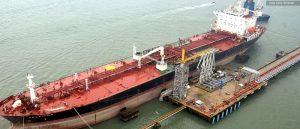…as Dakuku canvasses for dedicated cargo ports
Nigerian ship owners and other maritime industry stakeholders who gathered at the Oil Trading and Logistics Expo (OTL 2019) in Lagos recently, have pushed for fully owned Nigerian vessels to be given the chance to lift crude oil, saying it would be a big boost to the indigenous shipping industry and create millions of jobs.
This is as Dakuku Peterside, director-general of NIMASA, called for the introduction of designated ports to handle particular cargoes.
President of Ship Owners Association of Nigeria (SOAN), Mkgeorge Onyung lamented the absence of Nigerian-owned vessels conducting business within Nigerian waters. He said there was an urgent need to empower Nigerian vessels with crude oil freight jobs within the country’s cabotage water.
Dakuku, NIMASA DG, called for the introduction of designated ports to handle particular cargoes.
Dakuku, who joined other maritime and oil & gas industries stakeholders and investors at the 13th edition of the conference themed, “Achieving Downstream Competitiveness through Growth, Innovation, and Technology,” identified measures that could help to improve efficiency and service delivery in the maritime sector.
“In line with global best practices, there are several measures that we should give serious consideration if we are to improve upon the efficiency of our industry. Firstly, we must reduce vessel turnaround times at our ports and terminals to minimise logjams, which have a knock-on negative effect on the entire system chain.
“The introduction of dedicated ports to handle specific cargoes, as obtains in world leading ports, would also greatly improve on our service delivery and efficiency,” said Dakuku who was represented by David Oboma, NIMASA’s assistant director, Surveillance.
Dakuku, who spoke during a session with the theme, Ship to Shore and Efficiency of Shipping Petroleum and Crude Oil Cargo, also said, “Improving upon the draft capacity by dredging our existing ports to widen the scope of vessels which can berth would help to eradicate the need for Ship-to-Ship transfers at sea.
Those who featured at the session chaired by renowned maritime law expert, Mr. Emeka Akabogu, included the Chief of Naval Staff, Vice Admiral Ibok Ekwe Ibas, who was represented by Director of Operations, Naval Headquarters, Rear Admiral Ibikunle Olaiya; President, Ship owners’ Association of Nigeria (SOAN), Dr. McGeorge Onyung; President of Nigeria Ship-Owners Association (NISA) and CEO, Sea Transport Services Nigeria Limited, Mr Aminu Umar; and Group General Manager, Shipping, Nigerian National Petroleum Corporation (NNPC), Mrs. Aisha Ahmadu Katagum.
Also speaking at the session, Umar bemoaned the amount of bureaucracy that continued to hamper the ease of doing business in Nigeria’s territorial waters. He identified insecurity as a persistent menace to the maritime sector as it meant high cost of doing business in Nigeria.
The annual OTL Africa Downstream Week, which is widely acknowledged as Africa’s biggest platform for downstream oil and gas businesses, brought together experts and stakeholders in the oil and gas as well as maritime sectors from across the continent and beyond to discuss the way forward for the shipping industry.
Convener of the conference, Emeka Akabuogu, a maritime lawyer, while speaking with business a.m on OTL 2019, shortly after the expo was declared open, said the downstream sector remained the most crucial to Nigerians.
“The downstream market traverses shipping and maritime, policy, legislations and law. The legislations and policy for downstream define a lot of what is necessary to ensure sustainability of policies knowing very well that policy has quite a lot of issues relating to petroleum that affect every other segment of the industry, so that is what drives the event—to see that there is efficiency in the supply chain; that the value across board is conserved and all the key segments along that value chain, whether shipping, distribution, haulage or marketing of petroleum products,” he said.
According to him, the aim of the OTL is to bring together this diversity of segments into one body and to be able to articulate policies which affect every single subsector.
He said the principal challenge in the downstream subsector had been policy, which largely has to do with the price regime.
He said, ”It has been ensuring that the right policies are in place and the policies have to do with the price regime. The price today remains at a tag and market has been keen over the years to ensure that these price tags are changed so that the market can be more competitive. As it is, what drives the market is largely patronage and then competition comes in—competition across the value chain—quality increases, safety increases and that value which is given to the end consumer increases.”
On whether the Nigerian market could be described as efficient, Akabogu said, “Efficiency is relative. Although at the end of the day you measure efficiency by the output which you have. At this point in time, if you drive into any filling station, you will be able to buy fuel without queue So, to some, that is efficiency but to some, it is not efficient because there is no adequate room for private sector operation, rather what you have is government which dominate the chain for key products like PMS (fuel). So, if compared to some other countries where you have non-involvement of government, that is not efficiency. Ultimately, efficiency is one of the things which OTL tries to achieve so that all these perspectives are taken advantage of.”








